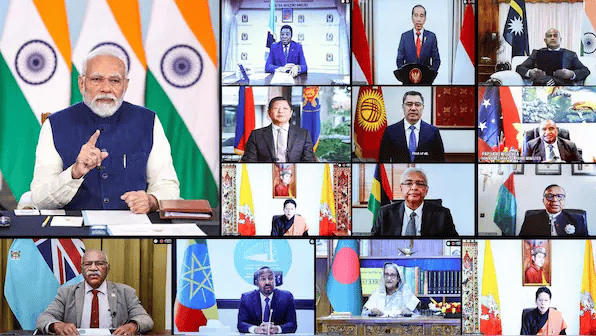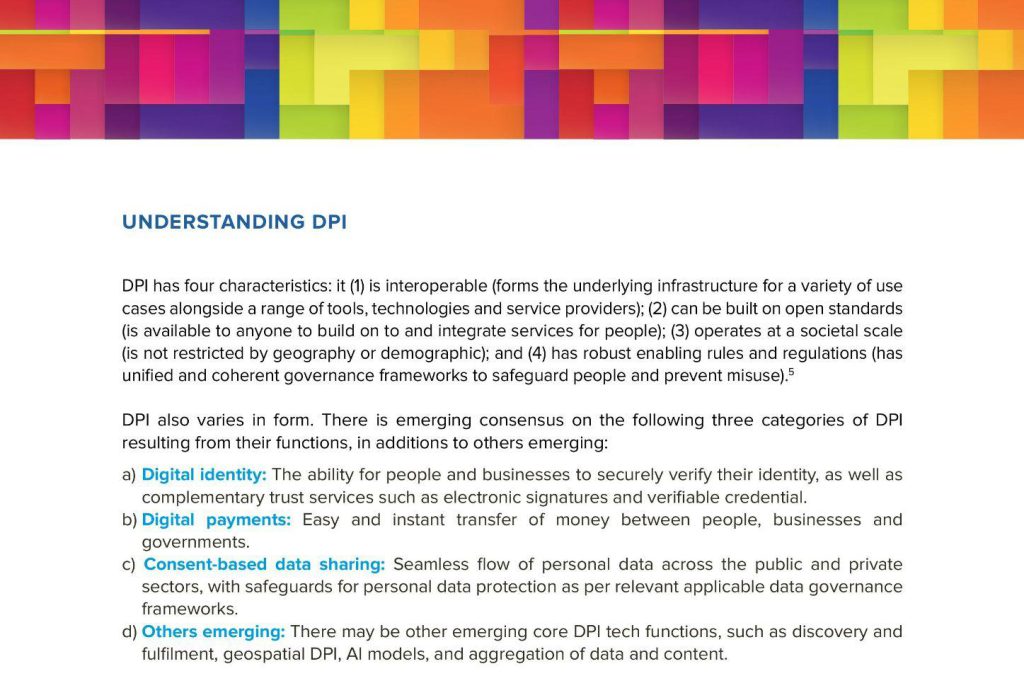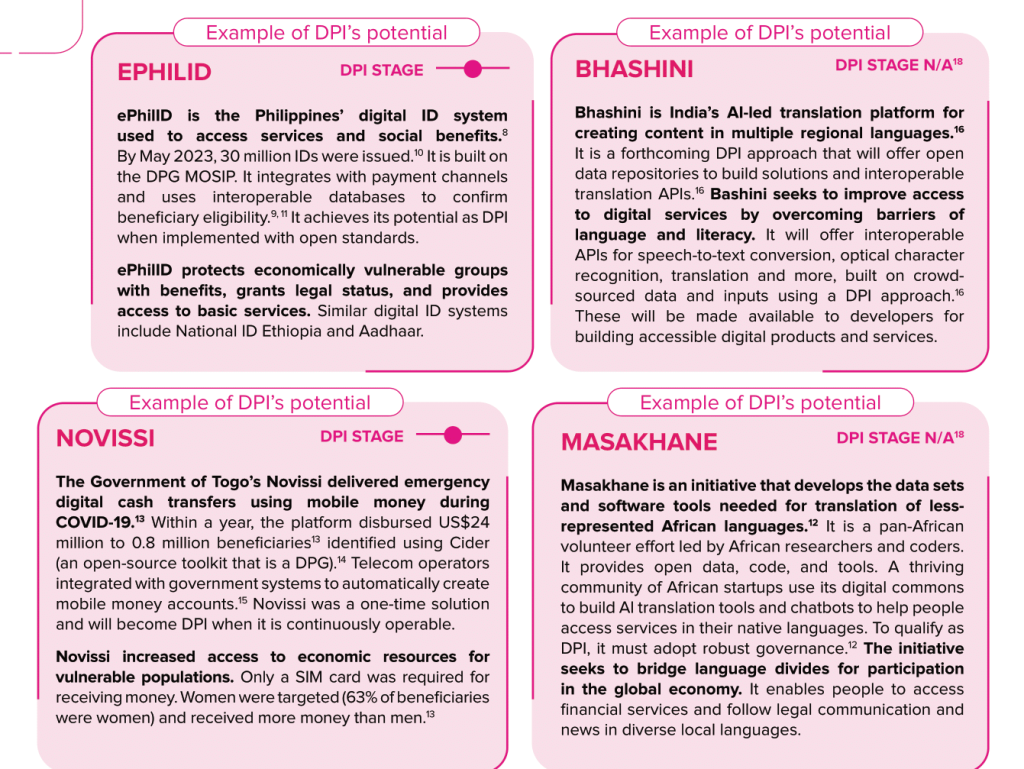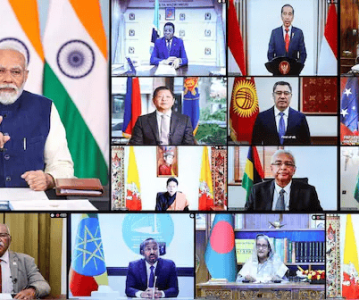
Author: Jessica Saler
The Voice of the Global South Summit: Making Space & Prioritising Digital Public Infrastructure
Last week I was researching online when I came across the Voice of the Global South Summit (VOGSS) that occurred this past summer. It gathers representatives from countries that fall within the “Global South”, and allows them to voice their priorities to development. I couldn’t help but wonder why I hadn’t heard of this before – after all, don’t we want to hear from those directly impacted the most by conflict, poverty, and climate change? Should we not be ensuring that development projects and initiatives are guided by what they have to say? Sadly, maybe I hadn’t read about it before because I reside in the Global North, where there seems to be an ideology that we have all the answers, and therefore don’t need to hear the voices of others. So, if you’re like me and don’t think the algorithm is going to simply show you alternative voices outside of the Global North, keep reading for a more in-depth look at the ideas explored at the 3rd Voice of the Global South Summit!
To rewind a bit, August 17, 2024 India held the 3rd VOGSS. This summit provides the opportunity for various countries in the Global South to gather, share priorities and initiatives with one another, and provide a common platform in which their voices are not crowded out by the Global North. The theme of the 3rd VOGSS, “An Empowered Global South for a Sustainable Future” guided discussions surrounding conflict, climate change, poverty – all of which are the most concerning in the Global South. It is no surprise then that countries representing over 60% of the world’s population attended the summit (Chair’s summary: 3rd Voice of Global South Summit, 2024).
The summit itself represents changing discourses to inequality and development – after all, the Global North often control narratives suggesting that they are the “heroes”, and the Global South are “victims”. Lauren Kogen even describes how “the relationship between the Global North and South [are portrayed] as one of Helper and Helpless. Northern countries were never portrayed as having any role in causing the crises, and were almost always portrayed as able to fix them (though exactly how was often left unstated).” (Kogen, 2018, p. 124). Kogen then goes on to discuss the problem of creating this victim ideology in the Global South and how the discourse the West uses to portray their innocence actually makes them seem incompetent. Kogen says “there is a tendency to speak about the global other using adjectives that are almost always associated with basic primal instincts and emotions: despair, hope, bravery… there is little to no acknowledgement of the intellectual or political capabilities for those being helped.” (p. 124).
The VOGSS breaks down former stereotypes of the Global South, demonstrating that despite the challenges their countries face, they are in fact capable of collaborating to think strategically about development, collaboration with one another, and practices that can be applied to strengthen the globe and empower the Global South. This approach of what I think of as glocal participation, combining the concept of participatory development with countries in the Global South that are directly affected by the issues discussed, which allows for opportunities to create new practices in development.
In the Chair’s Summary of the VOGSS (Chair’s summary: 3rd Voice of Global South Summit, 2024), I noticed that discourse focused on inequality and not poverty. We see words such as empowerment, transformation, sharing, and access were repeatedly used in their discussions around priorities and solutions to common challenges, but the concept of poverty was never brought up. This reminds me of Jan Pieterse (2018) when they say “there is an international consensus on the importance of reducing poverty, but there is no consensus and no global perspective on inequality” (p. 86). One possibility is because poverty does not force the socio-economic hierarchies and power structures to adapt – whereas addressing inequalities puts the powerful at risk of no longer being what I mentioned earlier as the “hero”. That isn’t to say poverty doesn’t tie into inequalities – in fact, if we can address poverty then we would see an increase in accessibility and affordability to much-needed resources to help develop third-world countries. But it does require us to question some of the most well-known development agencies and organizations (such as the United Nations Sustainable Development Goals and 2030 agenda).
Another common theme I noticed in the VOGSS was the use of technology. To alleviate inequalities, we need to prioritize accessibility to technology. In fact, nearly every Foreign Ministers’ Session at the 3rd VOGSS discussed technology, which brings forth new concepts of development priorities – meaning that it’s not about giving cell phones to everyone, but making sure that emerging technology is affordable AND accessible at all levels of society (Chair’s summary: 3rd Voice of Global South Summit, 2024).
This theme of technology accessibility ties very much into the Sustainable Development Goals (SDGs) outlined by the United Nations (UN). In fact, the UN released a document on how to accelerate all SDGs through the prioritized use of Digital Public Infrastructure (DPI). The UN believes that if we increase the use of financial DPI in the Global South, the economic growth can increase 20-30% by 2030 (United Nations Development Programme, 2023, p.3). If you want to read the entire report, click here. And if the concept of DPI’s overwhelms you – don’t worry, you aren’t alone. The UN even tried to break down the concept to discuss the core principles behind it, and how it encompasses both capacity and accessibility. Concepts of development are changing as technology advances, and we must consider how our development projects in the Global South are helping them keep up with these changes.

It’s incredibly promising and exciting to see the Global South create their own discussion which sends a message on an international scale that the discourse and understanding of development approaches is changing, and we must make sure to include the voices of everyone. The changing narratives remind us that the Global South are not victims, incapable of strategic thought, or unable to work together – rather, it is a reminder that they can help themselves if given the support and accessibility to the same tools and resources that we find in the Global North. But that doesn’t mean the Global North’s practices or solutions are going to be the same way – in fact, it’s quite the opposite of what I am suggesting. Accessibility to the same tools and resources (such as modern technology) will allow these countries to create their own solutions and approaches that work best for their country. It would be naïve to think that one approach would apply to every country, and frankly it would suggest a very traditional way of thinking about development.
Check out the below infographic for examples of programs already successfully implementing Digital Public Infrastructure in the Global South:

We need to encourage the changed narrative, provide more platforms like the VOGSS to elevate and empower the voices of the Global South and pay attention to the changing understandings of what development is, and who we look to for solutions. We also need to rethink development projects’ involvement of technology capacity, and if digital public infrastructure is being prioritized and maximized in these projects. The Voice of the Global South Summit is a crucial step in accomplishing a stronger, newer way of thinking about development, and those in the Global North needs to shift from trying to provide the solutions to instead supporting the Global Souths glocal participation and strategies.
To conclude today’s insights into the 3rd VOGSS, I will share a video of Prime Minister Modi’s closing remarks from the 2023 VOGSS, saying “The Voice of the Global South needs to set it own tone. Together, we need to escape the cycle of dependency on systems and circumstances which are not of our making” (Modi, 2023).
Sources:
Government of India. (2024, August 20). Chair’s summary: 3rd Voice of Global South Summit. Ministry of External Affairs. https://www.mea.gov.in/bilateral-documents.htm?dtl%2F38186%2FChairs+Summary+3rd+Voice+of+Global+South+Summit+August+17+2024=
Kogen, L. (2018). For Celebrity Communication About Development To Do Good. In Communication in International Development: Doing Good or Looking Good? (pp. 118–134). Routledge.
Modi, D. (2023, January 12). PM’s closing remarks at the inaugural leaders’ session of Voice of Global South Summit 2023 | prime minister of India. https://www.pmindia.gov.in/en/news_updates/pms-closing-remarks-at-the-inaugural-leaders-session-of-voice-of-global-south-summit-2023/
Nederveen Pieterse, J. (2018). Multipolar globalization: Emerging Economies and Development. Routledge is an imprint of the Taylor & Francis Group, an Informa Business.
Trigunayat, A. (2024, August 16). Third Voice of Global South Summit: How India is institutionalising a developing world perspective amid polarising global order. Firstpost. https://www.firstpost.com/opinion/third-voice-of-the-global-south-summit-how-india-and-developing-world-perspective-amid-polarising-global-order-13805378-13805378.html
United Nations Development Programme. (2023). Accelerating the SDGs Through Digital Public Infrastructure. New York. https://www.undp.org/sites/g/files/zskgke326/files/2023-12/undp-accelerating-the-sdgs-through-digital-public-infrastructure-v2.pdf

